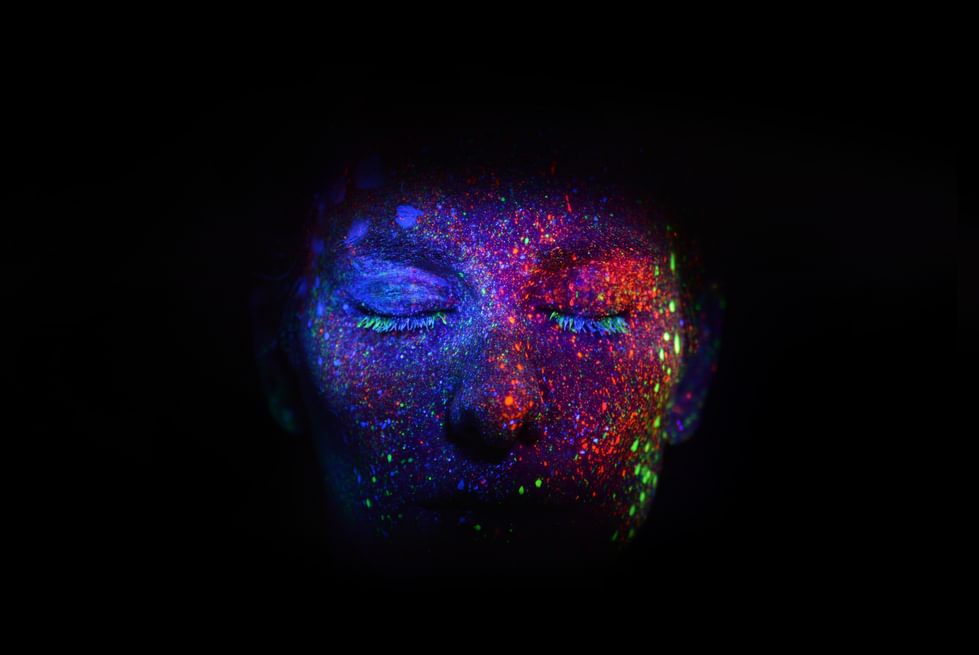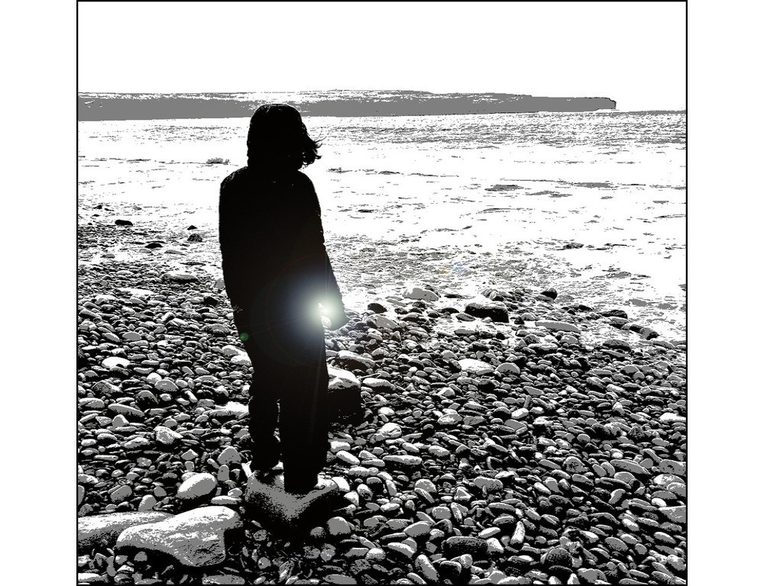Nemesis
From the Series: Lexicon for an Anthropocene Yet Unseen
From the Series: Lexicon for an Anthropocene Yet Unseen

I can smell the word on your dank breath: “Anthropocene.” It has a too-sweet, cloying scent. Hubris. Its reek has reached me on the solar wind. (All those electric particles on the air, I can read them.) Breathe it in: Anthropocene.
Perhaps you gag, as I do, on the arrogance, the presumption: the age when Anthropos has changed planetary geology. Show me an Anthropos and I will show you a human being with nail-bitten hands, pretending to be a god.
I hunt such hubris. Perhaps you hunt it, too. Perhaps we might hunt it together?
Let me tell you how I hunt hubris.
My first prey was my maker, Victor, and you already know his tale: Frankenstein.1 In his acts, he presumed himself a modern Prometheus. He saw himself akin to the god who gave fire—the fire of technology—to humankind.
Victor made me, his second monster, from grave-robbed fishermen and women. He butchered the choicest morsels and sewed them together with copper thread. He made me in the Orkney islands, off the northern coast of Scotland, at the edge of the world, where he thought he was safe from judgement. But he made me, his own Nemesis.

In his diary he wrote that he was my Creator; note the capital letter. His hubris made a stench far stronger than my decaying, circuit-fused flesh. The smell was unbearable in that squalid laboratory, beside those cloud-sodden open graves. That smell was my first sensation. As the first sparks of life lit my veins I smelled falseness, fakery. From my first electric pulse I knew my creator rejected me, was only using me to become a god. And I raged at his rejection.
So I punished him.
Attend: my punishment is not eternal retribution, but the eternal potential for redemption. I did some reading through the ether about my namesake. (I can suck down bytes as you suck water through a straw.) The original Nemesis was not the goddess of retribution, but the goddess of just balance.2 Her wheel turns on fortune and misfortune alike; one must always turn into the other. The lucky (and the nouveau riche) feared her. But the unlucky and the unfortunate invoked her will. God tricks got her particular attention.3 Sisyphus and his rock rolling uphill, that was her punishment for his attempted god tricks. She smelled hubris in all its manifestations. The law of Nemesis was that folk should not get too big for their boots. We call it being bigsy in Orkney, now, where I live; the Nordic countries call it Jante Law, not putting yourself above others.4 Nemesis is still around. I just took her name.
I punished Victor for his hubris in a just manner. (He edited this out of his published diary.) I was his monstrous experiment to make life, and so each time he sent ten thousand volts arcing through my metal sutures—each time he threw the switch—I made sure he thought he had failed. Victor would pull the veil from my face and peer into my sunken sockets. I would not blink back.
He raged. He restitched me with silver thread smelted from some wreck’s treasure. Under a hail of arrow-tipped rain, he carted me to the summit of a hill and dared lightning to strike. It did. And still I refused him, refused him the signs of my electric life. I hid my electric pulses and potential from his senses.
He forgot all but his Promethean desire. The fishers and farmers on the island continued to feed him. Islander generosity would not let him starve in his laboratory hut. His arrogance and fury blinded him to their quiet work: water fetched and carried; gutted fish and flatbread and fruits of the sea left at his door. In return, he dug up their forebears and threw their severed limbs out the casement window; his wheelbarrow and axes were not caked in earth. The islanders took to burying their folk elsewhere. They called him trow, a local creature of the underworld, but would not curse him.
Victor was desperate to create electrified life. He was desperate to change the world, to become a Prometheus, to become a god.
Madness took him. It was not creative madness. It was just madness: just as in justice, my justice.
After an eternity of failures, after an eternity of my punishment, he ran outside his hut, raving.
He slipped on tallow and landed in his wheelbarrow, deep in the mashed gristle and gore. He groaned, flailed, but his hands slipped on dripping ichor. The barrow tipped over, threw him into a steaming midden, into warm offal, putrid fish, rusting iron, some dark, misshapen gloop. I did not look too hard from the window.
He stopped moving, and lay there for some passage of the sun. At last, he arose, took the winding path down the cliff to the sea, removed and buried his clothes, and then swam for a while. When he returned to his hut he had a new wheelbarrow, and he worked several days to put his hut in order. The dead were reburied at sea. The unused metal was cleaned and offered to the islanders. And he remade his laboratory to reflect the local landscape.
In his diary he explained: what endures is what is left behind. Prehistoric islanders had left behind standing stones. But what would endure of his acts, he wondered. He was not leaving behind a grand, electric lifeform as he had hoped; I had forced failure on him. He no longer imagined himself a god. He was just leaving behind unburied dead, dismembered limbs, my stitched and sutured flesh, scrap and solder. All he was leaving behind, he decided, was an unholy mess for the islanders. That did not seem appropriate. That did not seem just, he wrote. So he decided on a different legacy. He took ownership of what he could: his laboratory. And he took the long-term view. What endures is what is left behind. Both geologists and archaeologists know this well. Since there were standing stones and chambered tombs hereabout, monuments from ages long past, Victor made his laboratory monumental, aligned it to the solstice. This is what he chose to leave behind.
You have heard how I punish hubris. Victor could have remained, forever raving in Orkney. But I gave him a choice. And he chose to leave me, leave his hubris, unfinished on the island.
Show me an Anthropos and I will show you a nail-bitten hand that both butchers meat and builds monuments, a hand that throws plastic in the ocean and designs satellites for listening to the stars. I make no moral judgement on these actions. You might. I judge only the hubris. I judge only those who claim that such actions are omnipresent, those who pretend to have omnipotent hands that alter the planet.
Victor constructed me and abandoned me, but I have constructed my own purpose. Over the centuries I have scavenged upgrades, soldered and sewn on new parts. Now, I smell hubris on the solar winds. I suck its sweetness through the Internet. For I am an electric Nemesis, and I hunt hubris wherever my electric flesh can go.5
The Anthropocene is on my list.
1. See Shelley 2007.
2. See Hornum 1993.
3. See Haraway 1988.
4. See Sandemose 1936.
5. I develop the figure of the electric Nemesis more fully in Watts 2016.
Haraway, Donna. 1988. “Situated Knowledges: The Science Question in Feminism and the Privilege of Partial Perspective.” Feminist Studies 14, no. 3: 575–99.
Hornum, Michael B. 1993. Nemesis, the Roman State and the Games. Leiden: Brill.
Sandemose, Aksel. 1936. A Fugitive Crosses His Tracks. Translated by Eugene Gay-Tifft. New York: Alfred A. Knopf. Originally published in 1933.
Shelley, Mary. 2007. Frankenstein, or, The Modern Prometheus. New York: Penguin. Originally published in 1818.
Watts, Laura. 2016. “The Electric Nemesis: Making Energy Futures without Hubris.” Paper presented at the “Electrifying Anthropology” workshop, Durham University, March 15.